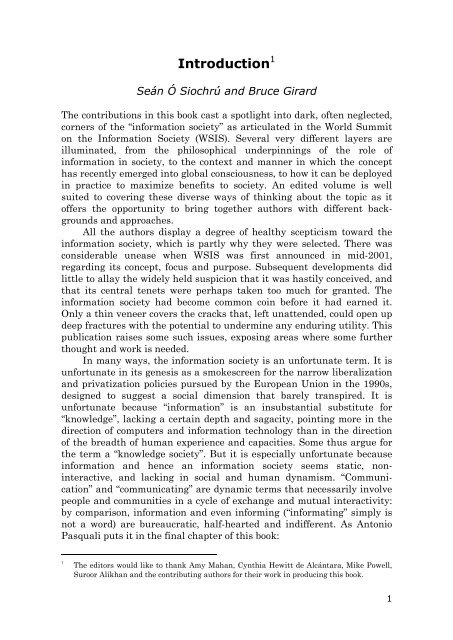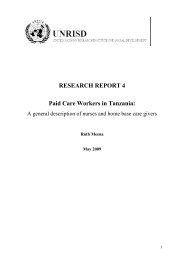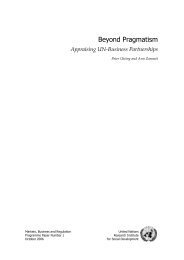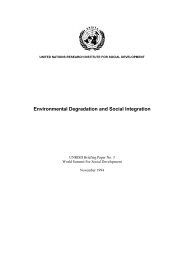communicating in the information society - United Nations Research ...
communicating in the information society - United Nations Research ...
communicating in the information society - United Nations Research ...
Create successful ePaper yourself
Turn your PDF publications into a flip-book with our unique Google optimized e-Paper software.
Introduction 1<br />
Seán Ó Siochrú and Bruce Girard<br />
The contributions <strong>in</strong> this book cast a spotlight <strong>in</strong>to dark, often neglected,<br />
corners of <strong>the</strong> “<strong>in</strong>formation <strong>society</strong>” as articulated <strong>in</strong> <strong>the</strong> World Summit<br />
on <strong>the</strong> Information Society (WSIS). Several very different layers are<br />
illum<strong>in</strong>ated, from <strong>the</strong> philosophical underp<strong>in</strong>n<strong>in</strong>gs of <strong>the</strong> role of<br />
<strong>in</strong>formation <strong>in</strong> <strong>society</strong>, to <strong>the</strong> context and manner <strong>in</strong> which <strong>the</strong> concept<br />
has recently emerged <strong>in</strong>to global consciousness, to how it can be deployed<br />
<strong>in</strong> practice to maximize benefits to <strong>society</strong>. An edited volume is well<br />
suited to cover<strong>in</strong>g <strong>the</strong>se diverse ways of th<strong>in</strong>k<strong>in</strong>g about <strong>the</strong> topic as it<br />
offers <strong>the</strong> opportunity to br<strong>in</strong>g toge<strong>the</strong>r authors with different backgrounds<br />
and approaches.<br />
All <strong>the</strong> authors display a degree of healthy scepticism toward <strong>the</strong><br />
<strong>in</strong>formation <strong>society</strong>, which is partly why <strong>the</strong>y were selected. There was<br />
considerable unease when WSIS was first announced <strong>in</strong> mid-2001,<br />
regard<strong>in</strong>g its concept, focus and purpose. Subsequent developments did<br />
little to allay <strong>the</strong> widely held suspicion that it was hastily conceived, and<br />
that its central tenets were perhaps taken too much for granted. The<br />
<strong>in</strong>formation <strong>society</strong> had become common co<strong>in</strong> before it had earned it.<br />
Only a th<strong>in</strong> veneer covers <strong>the</strong> cracks that, left unattended, could open up<br />
deep fractures with <strong>the</strong> potential to underm<strong>in</strong>e any endur<strong>in</strong>g utility. This<br />
publication raises some such issues, expos<strong>in</strong>g areas where some fur<strong>the</strong>r<br />
thought and work is needed.<br />
In many ways, <strong>the</strong> <strong>in</strong>formation <strong>society</strong> is an unfortunate term. It is<br />
unfortunate <strong>in</strong> its genesis as a smokescreen for <strong>the</strong> narrow liberalization<br />
and privatization policies pursued by <strong>the</strong> European Union <strong>in</strong> <strong>the</strong> 1990s,<br />
designed to suggest a social dimension that barely transpired. It is<br />
unfortunate because “<strong>in</strong>formation” is an <strong>in</strong>substantial substitute for<br />
“knowledge”, lack<strong>in</strong>g a certa<strong>in</strong> depth and sagacity, po<strong>in</strong>t<strong>in</strong>g more <strong>in</strong> <strong>the</strong><br />
direction of computers and <strong>in</strong>formation technology than <strong>in</strong> <strong>the</strong> direction<br />
of <strong>the</strong> breadth of human experience and capacities. Some thus argue for<br />
<strong>the</strong> term a “knowledge <strong>society</strong>”. But it is especially unfortunate because<br />
<strong>in</strong>formation and hence an <strong>in</strong>formation <strong>society</strong> seems static, non<strong>in</strong>teractive,<br />
and lack<strong>in</strong>g <strong>in</strong> social and human dynamism. “Communication”<br />
and “<strong>communicat<strong>in</strong>g</strong>” are dynamic terms that necessarily <strong>in</strong>volve<br />
people and communities <strong>in</strong> a cycle of exchange and mutual <strong>in</strong>teractivity:<br />
by comparison, <strong>in</strong>formation and even <strong>in</strong>form<strong>in</strong>g (“<strong>in</strong>format<strong>in</strong>g” simply is<br />
not a word) are bureaucratic, half-hearted and <strong>in</strong>different. As Antonio<br />
Pasquali puts it <strong>in</strong> <strong>the</strong> f<strong>in</strong>al chapter of this book:<br />
1<br />
The editors would like to thank Amy Mahan, Cynthia Hewitt de Alcántara, Mike Powell,<br />
Suroor Alikhan and <strong>the</strong> contribut<strong>in</strong>g authors for <strong>the</strong>ir work <strong>in</strong> produc<strong>in</strong>g this book.<br />
1
















